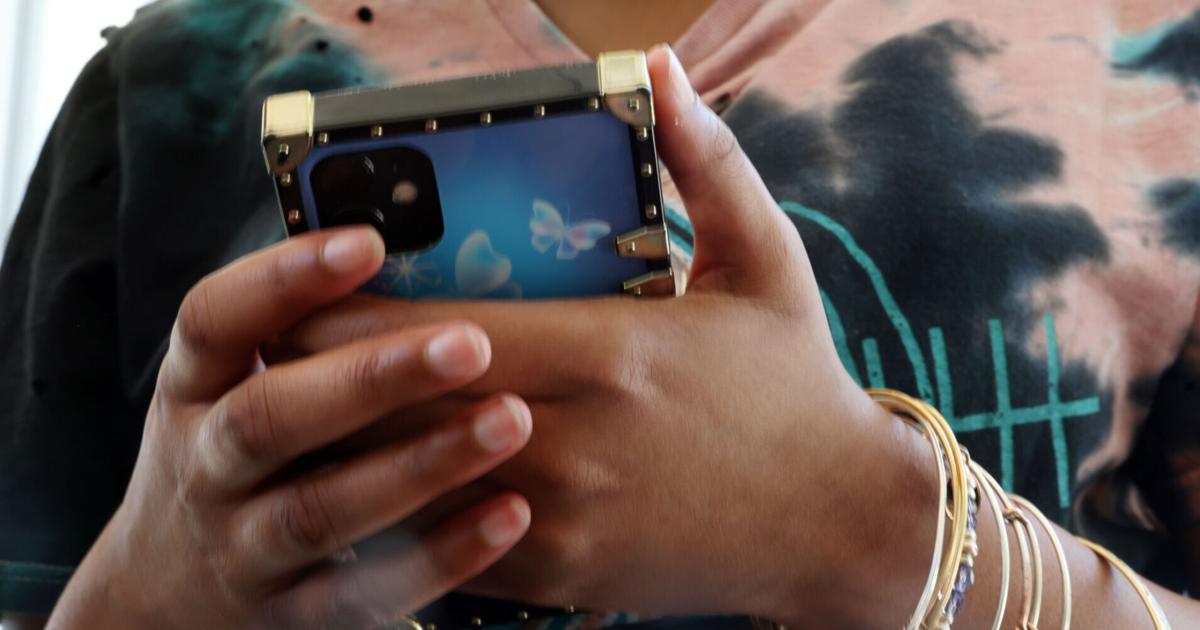Cellphones in public schools are all the buzz right now, at times overwhelmingly so.
With so many entertaining reels, feeds and notifications at students’ fingertips, handheld devices command a lot of attention, even during class time.
As summer break approaches in Roanoke, school officials are pondering new student cellphone policies for next academic year. The devices are too distracting, parents and teachers say.
Numerous divisions in the Roanoke and New River valleys are doing the same. A recent report about a in-class phone ban at Christiansburg Middle School showed that students are happier and more attentive without them.
A recent Roanoke school survey showed a divide between parents and teachers who want more enforcement and students who don’t.
Some students at Roanoke’s Patrick Henry High School, including Desiree Davis and Monaysia Dudley, are at least receptive to the idea of lessening phones’ presence in class.
People are also reading…
“We’re teenagers, so of course we want our phones,” Dudley said. “But it would help us stay focused and active in class.”
Patrick Henry High School students Desiree Davis, left, and Monaysia Dudley are open to the idea of a lesser phone presence in class. The friends hang out in the library after school on Thursday.
Both students said phones are a major distraction in the classroom. Some teachers are strict about enforcing phone-free environments, while other instructors are more lenient, the students said.
“I want my phone, but I also don’t really need it at the same time,” Davis said. “I got to get work done, I want to graduate.”
Some students really do need their phones for school, whether to help monitor personal health data, for work or research purposes, they said. But the distraction factor for many students – and even for adults – is hard to deny.
“I feel like everybody has a phone addiction, no matter who you are,” Davis said. “Everybody has an addiction to technology, it’s become a major thing.”

Patrick Henry High School students Marcel Murray, from left, Tequan Martin, Myrikal Walton and Kyliyah Aristilde hang out at the library after school on Thursday. School officials are considering new student cellphone policies for the next academic year.
A few grades younger, the students at Woodrow Wilson Middle School know the rules for cellphone use, said Principal Bradley Jenkins.
“We initiated ‘no phones during instruction’ at the beginning of the school year,” Jenkins said. “We’re really seeing some positive returns on it.”
This is the first school year that cellphone rules were enacted at the middle school in Raleigh Court, he said. Student phone habits needed curtailing, so administration struck up a compromise.

Marcel Murray, a senior at Patrick Henry High School, hangs out in the library after school on Thursday. Murray thinks students should be able to keep their phones with them during school, “so we can contact people if we’re in danger or if disaster strikes out of nowhere,” he said.
“We allow them to use their cellphones for music or games during their homeroom, which is when they first get to school, and then also during lunchtime,” Jenkins said. “We do that as a reward, but then also reserve the right to pull that back.”
If a student is on their phone during class time, it’s confiscated and sent to the front office until after school lets out.
“At all instructional phases of the day, cellphones and earbuds are not allowed,” Jenkins said. “If we see them, we take them.”
He said “phone sweeps” are an important part of enforcing the rule. Teachers coordinate multiple times per week to quickly scan classrooms and hallways for unauthorized cellphone use.
“Any phones we see, we take,” Bradley said. “We give them back at the end of the day.”
The phone sweeps started in January, after the no phones rule had already been in effect all fall.

Patrick Henry High School student Monaysia Dudley uses her phone after school at the library on Thursday.
“This was not something that we wanted to surprise anybody with,” Jenkins said. “We put that information out to the community so that they knew that it was coming. We advertised it to the students, gave everybody fair warning.”
Without that element of accountability, students’ minds tend to wander toward whatever conversations might be waiting on the screen in their bookbag. Social media, text messages and other attention-seeking phone apps keep students partially engaged, even when they’re off their device, he said.

Patrick Henry High School students Desiree Davis, left, and Monaysia Dudley are open to the idea of a lesser phone presence in class. The friends hang out in the library after school on Thursday.
“We wanted to find a way to kind of reduce some of the drama that can be caused through social media exchanges,” Jenkins said. “Some of those things that would take students’ minds out of and away from the instruction.”
Results so far have been positive for students and teachers, he said. Parents are fine with the practice, too.
“We’ve seen quite a positive turn around, not only for phones that we’re collecting when we do our sweeps. Those numbers are going down,” Jenkins said. “But even some of the social concerns that I mentioned earlier that have been prominent in some of our schools, those are even going down.”
The approach at Woodrow Wilson Middle School is one example of how a local school is dealing with the nationwide educational concern that is youth cellphone use.
As a school division, Roanoke staff and administrators are weighing options for implementing a stronger cell phone policy, after district surveys revealed the current rules are irregularly enforced. Similar discussions are occurring in Montgomery County, too.
Also, Roanoke is among hundreds of school divisions joined in a lawsuit against social media companies for developing products disruptive to class time and harmful to children’s educations. Apps including Facebook, TikTok, Snapchat and YouTube are named in the pending lawsuit.
Three mothers who founded a group called Phone-Free Schools Movement say part of the solution includes holding those social media companies accountable.
“That’s a big piece, and we would love that to happen,” said Sabine Polak. “But you know, that could take a while. Our kids really don’t have the time to waste, especially when they’re in the most developmentally important time of their lives.”
Polak said she came together with Kim Whitman and Mileva Repasky to advocate for no-phone policies from the first to the last bell in their kids’ schools, and the effort has spread nationwide. Phones should be off-limits all school day, they said.
“Not in their backpack where they’ll be able to still have access to it,” Repasky said. “Not anywhere on their person.”
They point to studies that suggest cell phones in classrooms impact not just students’ grades, but also their social and emotional learning.
Last year, the U.S. Surgeon General issued an advisory about social media and youth mental health, calling it an urgent public health issue.
Dr. Michael Rich, director of the digital wellness lab at Boston Children’s Hospital, says when youth don’t have cellphones at school, they work more curiously and creatively.
“Loads of research shows that comprehension is less for students when phones are present… even if I don’t have my phone out,” Whitman said. “We see it as a collective action concern. It has to be all of us, because it’s the secondhand-smoke effect… My test scores go down just because it’s in the room.”
As solutions, the phone-free movement recommends schools use phone lockers or equip students with a brand of pouches that lock phones away during the school day.
“Can the social media companies pay for phone lockers?” Whitman said. “That’s one way they can help solve this issue.”
Smartphones are ubiquitous today, but first stormed into mainstream use in the late 2000s. Still now, counting toward 20 years later, schools are contending with the issue of student cellphone use.
“In order for us to all push this forward, we have to hold ourselves accountable,” Polak said. “I do believe that is a big piece of why we haven’t gotten further with this, because we’re all kind of addicted, and have to turn around and look ourselves in the mirror.”
Maybe adults can take away some lessons when considering their own screen habits. Children do tend to pick up the behaviors of adults around them, especially their parents.
“It really does start with us,” Repasky said. “Parents, administrators, teachers – we all have to work together to set that example for the kids, or it’s going to be impossible for them to follow that.”
Back at Woodrow Wilson Middle School, Principal Jenkins, 44, said he’s been known to enjoy a mobile game or two.
“I’ve been playing Clash Royale for probably seven or eight years,” Jenkins said. “Students who are in the cafeteria, I see them playing it and I’ll walk up to them and be like, ‘oh, I’ve played that card before.’”
But when students ask Jenkins if he’ll play a match of Clash with them, he uses the opportunity to set an example. He tells students:
“Well, I’m sorry. My personal phone is in my office because right now I’m at work, just like when you’re in the classroom,” Jenkins said. “Just like you can’t have it when you’re at your job, which is learning, I can’t have it while I’m at work.”
Jenkins said he hopes that message is received. Some lessons are better learned face-to-face from teachers, removed from readymade distractions offered by modern technology. Especially now that students are back in school, and do not have to attend remotely anymore.
“It helps not having phones in the school. It really helps when students know they’re being held accountable,” Jenkins said. “It takes their brain away from whatever may be going on in that little computer, and helps them focus on instruction.”
Luke Weir (540) 566-8917

Alex Mitchell is your go-to expert for all things mobile. With a passion for the latest smartphones, apps, and mobile innovations, Alex provides in-depth reviews, insightful analyses, and breaking news about the ever-evolving world of mobile technology. Stay connected with Alex to navigate the fast-paced realm of mobile devices.


